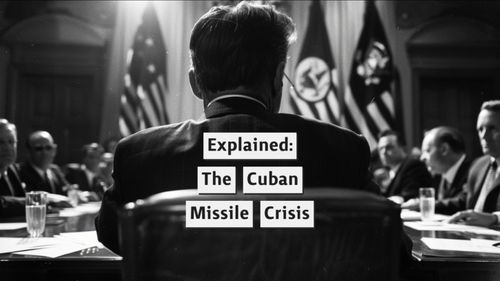The Day the World Held its Breath: What We Learned from the Cuban Missile Crisis
Apr 09, 2024 · 2 mins read
0
Share

In October 1962, the world stood on the brink of nuclear annihilation. The Cuban Missile Crisis, a 13-day confrontation between the United States and the Soviet Union, brought the world to the edge of the abyss.
Save
Share
The crisis began when American spy planes discovered Soviet nuclear missile sites in Cuba, just 90 miles off the coast of Florida. President John F. Kennedy was faced with a difficult decision: invade Cuba or impose a naval blockade.
Save
Share
Kennedy chose the latter, and the world watched as Soviet ships approached the blockade line. The world held its breath, waiting for the inevitable confrontation that could have triggered a nuclear war.
Save
Share
But the crisis was averted when Soviet leader Nikita Khrushchev agreed to dismantle the missile sites in exchange for a US promise not to invade Cuba. The world breathed a sigh of relief, but the crisis had left a lasting impact.
Save
Share
The Cuban Missile Crisis was a wake-up call for the world. It exposed the dangers of the Cold War and the potential for nuclear conflict. It also demonstrated the power of diplomacy and the importance of communication in resolving international crises.
Save
Share
The crisis also had a profound impact on Kennedy. He later said that the experience had taught him the importance of being prepared for the worst-case scenario and the need to maintain open lines of communication with adversaries.
Save
Share
The crisis had a lasting impact on the world. It led to the establishment of the hotline between the White House and the Kremlin, a direct communication link designed to prevent misunderstandings and miscalculations.
Save
Share
The crisis also led to the Partial Nuclear Test Ban Treaty, which prohibited nuclear tests in the atmosphere, underwater, and in space. The treaty was a significant step towards nuclear disarmament and the prevention of nuclear war.
Save
Share
The Cuban Missile Crisis remains a defining moment in world history. It serves as a reminder of the dangers of nuclear weapons and the need for diplomacy and communication in resolving international crises.
Save
Share
The crisis also highlights the importance of leadership and decision-making in times of crisis. Kennedy's calm and measured response to the crisis helped prevent a catastrophic nuclear war and demonstrated the power of diplomacy and negotiation.
Save
Share
0